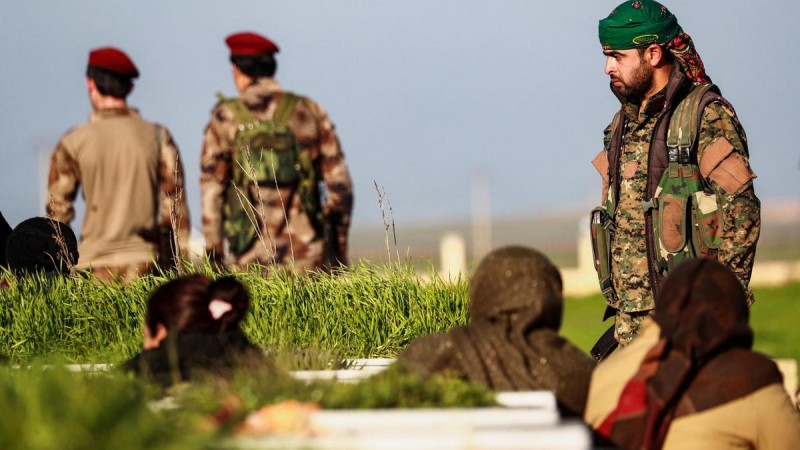- Home/
- News
Extremism must not be allowed to take hold again in the region

Funeral for a fighter for the Syrian Democratic Forces (SDF), killed while fighting ISIS in Hajin, Syria. Delill Souleiman / AFP
As the US announced its plan to withdraw 2,000 troops from Syria, US-backed troops were fighting ISIS militants trying to recapture Hajin in the east of the country – just further proof, if any were needed, that Donald Trump’s premature exit comes while the extremists still pose a serious threat.
Indeed, as the Kurdish-led Syrian Democratic Forces said, the withdrawal could lead to a resurgence of ISIS and give “terrorism the momentum to recover and conduct a terrorist campaign in the region”.
It is into this volatile breach that Turkish President Recep Tayyip Erdogan has stepped, declaring he will lead the fight against the remaining ISIS fighters in Syria. As a member of the 79-nation Global Coalition, Turkey does indeed carry some responsibility for countering and dismantling ISIS’s ambitions.
But it has not always proven itself capable of rising to the task. Its laissez-faire attitude to monitoring border cities enabled thousands of fighters to cross with ease into Syria before a clampdown in 2015 – too little, too late.
But it is the Kurds whose fate really hangs in the balance, not the extremists who united nations in a co-opted battle against hatred and a poisonous ideology.
Until now, it has only been a US presence that prevented Turkey from an all-out assault on Kurdish-led opposition groups. Ankara has long sought to weaken their positions and now has carte blanche to target factions it blames for leading a separatist movement.
That almost certainly puts the YPG directly in the firing line, as well as its sister arm the PYD, affiliated to the militant PKK in Turkey, which Ankara considers a terrorist organisation threatening its sovereignty.
Rather than a battle of one coalition unifying behind the common goal of tackling extremism, there is a danger of implosion within Syria as different actors seek to serve their own purposes.
While the Syrian Kurds will see the US withdrawal as the ultimate betrayal, there is a danger of the conflict rumbling on for years with no resolution.
Much of Syria is back under the control of Bashar Al Assad but nearly one third remains volatile.
ISIS leader Abu Bakr Al Baghdadi is still at large in the territory he once declared his caliphate.
Iraqi Prime Minister Adil Abdul Mahdi has yet to appoint a security minister or complete his cabinet, which leaves his country vulnerable to the rogue elements which once tore it apart.
In a phone call to Mr Mahdi, US Secretary of State Mike Pompeo emphasised the importance of protecting Iraq from “interference in its affairs”.
These are all potential timebombs threatening to jeopardise regional security. The international community must not let their own interests eclipse the goal of fighting the ideology which allowed ISIS to flourish.
Nor can the departure of American troops be used by Mr Erdogan as licence to exercise his maximalist policy and weaponise an ideological battle to target his rivals.
It is far from clear how Syria’s final borderland battles might end. The key will be not to lose sight of the threat extremists continue to pose, even when they no longer hold territory.
Source: Link


 Development of specialized PCVE web site is funded by EU FUNDS CN 2017-386/831 - "IPA II 2016 Regional Action on P/CVE in the Western Balkans"
Development of specialized PCVE web site is funded by EU FUNDS CN 2017-386/831 - "IPA II 2016 Regional Action on P/CVE in the Western Balkans"